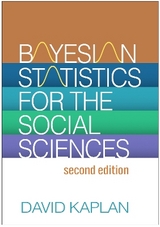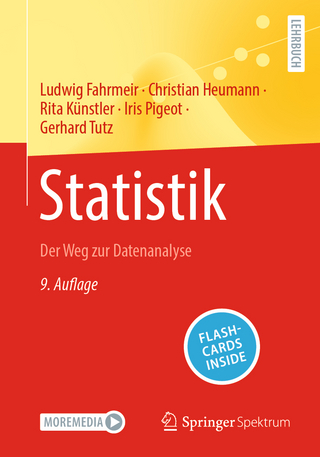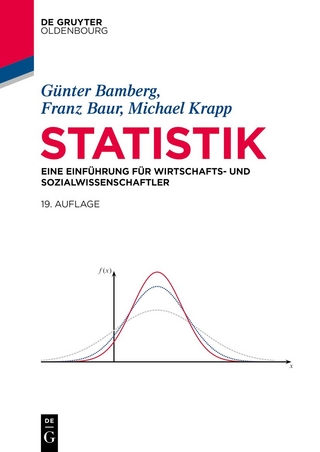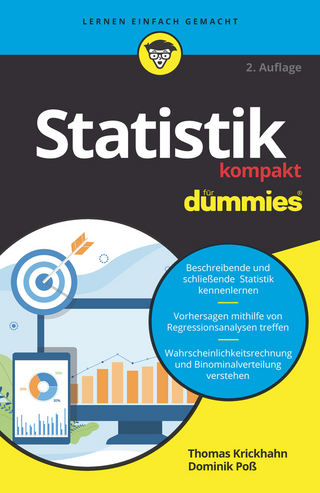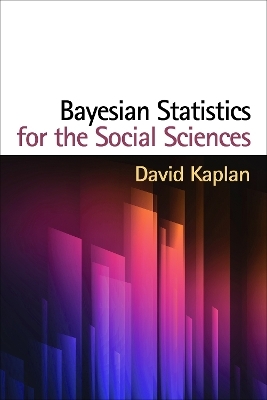
Bayesian Statistics for the Social Sciences, First Edition
Guilford Press (Verlag)
978-1-4625-1651-3 (ISBN)
- Titel erscheint in neuer Auflage
- Artikel merken
*Helps social scientists better examine the predictive quality of proposed models by incorporating prior knowledge.
*Includes worked-through examples from large, publicly accessible datasets, which are built on throughout the book.
*Uses open-source R software programs, such as MCMCpack and JAGS; readers do not have to master the R language.
*Online supplement: companion website provides R programs used in the book, plus data and code for the book's examples.
David Kaplan, PhD, is Professor of Quantitative Methods in the Department of Educational Psychology at the University of Wisconsin–Madison and holds affiliate appointments in the Department of Population Health Sciences and the Center for Demography and Ecology. Dr. Kaplan’s program of research focuses on the development of Bayesian statistical methods for education research. His work on these topics is directed toward application to quasi-experimental and large-scale cross-sectional and longitudinal survey designs. He is most actively involved in the Program for International Student Assessment, sponsored by the Organisation for Economic Co-operation and Development—he served on its Technical Advisory Group from 2005 to 2009 and currently serves as Chair of its Questionnaire Expert Group. Dr. Kaplan also is a member of the Questionnaire Standing Committee of the U.S. National Assessment of Educational Progress, is a Fellow of the American Psychological Association (Division 5), and was a Jeanne Griffith Fellow at the National Center for Education Statistics.
I. Foundations of Bayesian Statistics
1. Probability Concepts and Bayes' Theorem
1.1. Relevant Probability Axioms
1.1.1. Probability as Long-Run Frequency
1.1.2. The Kolmogorov Axioms of Probability
1.1.3. The Rényi Axioms of Probability
1.1.4. Bayes' Theorem
1.1.5. Epistemic Probability
1.1.6. Coherence
1.2. Summary
1.3. Suggested Readings
2. Statistical Elements of Bayes' Theorem
2.1. The Assumption of Exchangeability
2.2. The Prior Distribution
2.2.1. Noninformative Priors
2.2.2 .Informative Priors
2.3. Likelihood
2.3.1. The Law of Likelihood
2.4. The Posterior Distribution
2.5. The Bayesian Central Limit Theorem and Bayesian Shrinkage
2.6. Summary
2.7. Suggested Readings
2.8. Appendix 2.1. Derivation of Jeffreys' Prior
3. Common Probability Distributions
3.1. The Normal Distribution
3.1.1. The Conjugate Prior for the Normal Distribution
3.2. The Uniform Distribution
3.2.1. The Uniform Distribution as a Noninformative Prior
3.3. The Poisson Distribution
3.3.1. The Gamma Density: Conjugate Prior for the Poisson Distribution
3.4. The Binomial Distribution
3.4.1. The Beta Distribution: Conjugate Prior for the Binomial Distribution
3.5. The Multinomial Distribution
3.5.1. The Dirichlet Distribution: Conjugate Prior for the Multinomial Distribution
3.6. The Wishart Distribution
3.6.1. The Inverse-Wishart Distribution: Conjugate Prior for the Wishart Distribution
3.7. Summary
3.8. Suggested Readings
3.9. Appendix 3.1. R Code for Chapter 3
4. Markov Chain Monte Carlo Sampling
4.1. Basic Ideas of MCMC Sampling
4.2. The Metropolis–Hastings Algorithm
4.3. The Gibbs Sampler
4.4. Convergence Diagnostics
4.5. Summary
4.6. Suggested Readings
4.7. Appendix 4.1. R Code for Chapter 4
II. Topics in Bayesian Modeling
5. Bayesian Hypothesis Testing
5.1. Setting the Stage: The Classical Approach to Hypothesis Testing and Its Limitations
5.2. Point Estimates of the Posterior Distribution
5.2.1. Interval Summaries of the Posterior Distribution
5.3. Bayesian Model Evaluation and Comparison
5.3.1. Posterior Predictive Checks
5.3.2. Bayes Factors
5.3.3. The Bayesian Information Criterion
5.3.4. The Deviance Information Criterion
5.4. Bayesian Model Averaging
5.4.1 Occam's Window
5.4.2. Markov Chain Monte Carlo Model Composition
5.5. Summary
5.6. Suggested Readings
6. Bayesian Linear and Generalized Linear Models
6.1. A Motivating Example
6.2. The Normal Linear Regression Model
6.3. The Bayesian Linear Regression Model
6.3.1. Noninformative Priors in the Linear Regression Model
6.3.2. Informative Conjugate Priors
6.4. Bayesian Generalized Linear Models
6.4.1. The Link Function
6.4.2. The Logit-Link Function for Logistic and Multinomial Models
6.5 Summary
6.6 Suggested Readings
6.7. Appendix 6.1. R Code for Chapter 6
7. Missing Data from a Bayesian Perspective
7.1. A Nomenclature for Missing Data
7.2. Ad Hoc Deletion Methods for Handling Missing Data
7.2.1. Listwise Deletion
7.2.2. Pairwise Deletion
7.3. Single Imputation Methods
7.3.1. Mean Imputation
7.3.2. Regression Imputation
7.3.3. Stochastic Regression Imputation
7.3.4. Hot-Deck Imputation
7.3.5. Predictive Mean Matching
7.4. Bayesian Methods of Multiple Imputation
7.4.1. Data Augmentation
7.4.2. Chained Equations
7.4.3. EM Bootstrap: A Hybrid Bayesian/Frequentist Method
7.4.4. Bayesian Bootstrap Predictive Mean Matching
7.5. Summary
7.6. Suggested Readings
7.7. Appendix 7.1. R Code for Chapter 7
III. Advanced Bayesian Modeling Methods
8. Bayesian Multilevel Modeling
8.1 Bayesian Random Effects Analysis of Variance
8.2. Revisiting Exchangeability
8.3. Bayesian Multilevel Regression
8.4. Summary
8.5. Suggested Readings
8.6. Appendix 8.1. R Code for Chapter 8
9. Bayesian Modeling for Continuous and Categorical Latent Variables
9.1. Bayesian Estimation of the CFA Model
9.1.1. Conjugate Priors for CFA Model Parameters
9.2. Bayesian SEM
9.2.1. Conjugate Priors for SEM Parameters
9.2.2. MCMC Sampling for Bayesian SEM
9.3. Bayesian Multilevel SEM
9.4. Bayesian Growth Curve Modeling
9.5. Bayesian Models for Categorical Latent Variables
9.5.1. Mixture Model Specification
9.5.2. Bayesian Mixture Models
9.6. Summary
9.7. Suggested Readings
9.8. Appendix 9.1. “RJAGS” Code for Chapter 9
10. Philosophical Debates in Bayesian Statistical Inference
10.1. A Summary of the Bayesian Versus Frequentist Schools of Statistics
10.1.1. Conditioning on Data
10.1.2. Inferences Based on Data Actually Observed
10.1.3. Quantifying Evidence
10.1.4. Summarizing the Bayesian Advantage
10.2. Subjective Bayes
10.3. Objective Bayes
10.4. Final Thoughts: A Call for Evidence-Base Subjective Bayes
References
Index
| Erscheint lt. Verlag | 17.9.2014 |
|---|---|
| Reihe/Serie | Methodology in the Social Sciences |
| Verlagsort | New York |
| Sprache | englisch |
| Maße | 156 x 234 mm |
| Gewicht | 700 g |
| Themenwelt | Geisteswissenschaften ► Psychologie |
| Mathematik / Informatik ► Mathematik ► Statistik | |
| Medizin / Pharmazie ► Pflege | |
| Sozialwissenschaften ► Pädagogik | |
| Sozialwissenschaften ► Soziologie ► Empirische Sozialforschung | |
| Wirtschaft ► Volkswirtschaftslehre ► Ökonometrie | |
| ISBN-10 | 1-4625-1651-3 / 1462516513 |
| ISBN-13 | 978-1-4625-1651-3 / 9781462516513 |
| Zustand | Neuware |
| Informationen gemäß Produktsicherheitsverordnung (GPSR) | |
| Haben Sie eine Frage zum Produkt? |
aus dem Bereich
